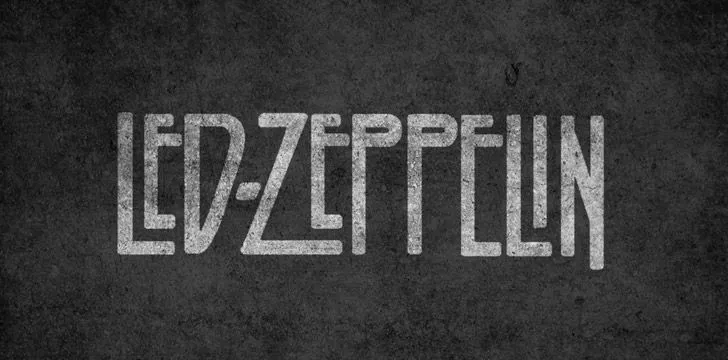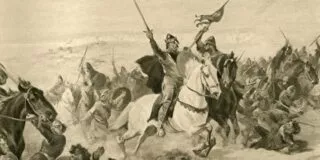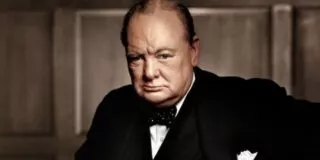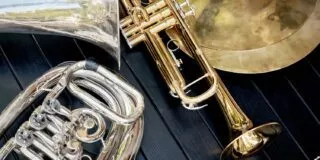Led Zeppelin is often regarded as one of the greatest bands in music history. There is only one band this writer would even rank above them in personal preference.
One of the best-selling bands of all time (the second best selling in the United States), their legacy continues and their fan base grows. Fusing folk, blues, rock, and other genres, they created a template that many have tried to replicate but all fall short.
Originally formed by guitarist Jimmy Page as “The New Yardbirds” to complete his contractual obligations when the original Yardbirds disbanded, Page eventually recruited vocalist Robert Plant, bassist John Paul Jones, and drummer John Bonham. They changed their name to “Led Zeppelin” though wanting “Lead” but feeling, according to one report, “thick Americans” would mispronounce the word.
The explanation behind the name was that The Who’s drummer and bassist, Keith Moon and John Entwistle respectively, originally pursued by Page to be in his group, felt a band featuring Page and fellow former Yardbirds guitarist Jeff Beck, also envisioned as part of the original line up, would go down like a “lead balloon”.
Although they are one of the biggest influences on modern music, they too had those who influenced them. The following, to the chagrin of many, is a list of 10 times Led Zeppelin lifted, borrowed, or stole outright from other musical acts.
Boogie with Stu (Lyrics from: “Ooh, My Head”)
Perhaps the most obvious example of Led Zeppelin lifting lyrics from a previously released song is the 1975 effort, “Boogie with Stu”.
Recorded in 1971 in London, the song evolved from a jam session with the road manager and pianist from The Rolling Stones, Ian “Stu” Stewart. Singer Robert Plant relied heavily enough on the Ritchie Valens’ song “Ooh, My Head”, released on Valens’ first album in 1959, the band added his mother, labeled “Mrs. Valens”, to the credits.
The band was later sued by Ritchie Valens’ music publisher, Kemo Music, for copyright infringement and settled out of court.
Jimmy Page is on record saying Plant “did lean on that lyric a bit”, so they had originally decided to give Valens’ mother the credit, because word in the music industry was that she had never received royalties from his music.
In the quote, published in Guitar World in 1998, Page seemed surprised that the owner of the copyright would sue despite the fact that they attempted to give credit to the original artist’s mother.
This would just be one of many examples of “the heaviest band of all time” being sued for copyright infringement.
Comparative lyrics:
“Ooh, My Head”
Well, well, now, now baby
Let’s just go all night long
Well, on, on, on, on, darlin
I just want you-to-go-on more
There won’t be no tuttie fruiti
No lolly pop, come on baby just
Rock, rock, rock
Well, now, now, now, now, honey
We gonna rock all night
Well babe, babe, babe, babe, baby
We’re just gonna go fine
Well on, on, on, on, darlin’
Ooh, my head!
“Boogie with Stu”
Been in town, my baby, We just got to rock on
Yeah, darling, we just got to go home
I don’t want no tutti-frutti, no lollipop
Come on, baby, just rock, rock, rock.
Yeah-yeah-yeah-yeah, honey
We’ve been shakin’ all night
Oh, darlin’, we just got to roll right
Ooh, my head… rock on.
Whole Lotta Love (Lyrics from: “You Need Love”/“You Need Loving”)
Willie Dixon is a name of which many casual music fans may not be aware. However, as a Grammy winner and inductee in the Blues Hall of Fame, Rock and Roll Hall of Fame, and Songwriters Hall of Fame, plus numerous credits and covers of his work, his legacy is firmly intact.
Seeing as it’s not the only time he’s featured on this list (more on that later), Dixon was clearly an influence on Page, Plant, Jones, and Bonham from the early stages of the band.
Originally released in 1969 as the opening song on their second album, “Whole Lotta Love” is now even released with a credit to Dixon on all publications.
Page’s guitar riff came to him as early as summer 1968 and features one of many examples of Plant using his moaning lyrics to convey his feelings of lust for the “woman” mentioned in the song. The production of the song, also done by Page, employed a backwards echo technique.
But not everything in the song was developed by Page and his group in the studio. As previously mentioned, lyrics by Willie Dixon are paraphrased in this song. In 1962, Muddy Waters recorded the blues track, “You Need Love”, with lyrics written by Dixon, which are described as being “about the necessity of love”.
To up the ante, in 1968, another British band, Small Faces, did their own recording of the Muddy Waters song they titled “You Need Loving”.
Small Faces vocalist Steve Marriott even claims that Page and Plant had seen his band perform the song and expressed interest in it, with Plant eventually singing the “Whole Lotta Love” lyrics with phrasing and pauses being the same.
Eventually, Led Zeppelin was sued in 1985 and settled out of court, in favor of Dixon. In 1990, Plant is quoted as saying that he needed lyrics to sing and that “you only get caught when you’re successful”.
Comparative lyrics:
“You Need Love”
You’ve got yearnin’ and I got burnin’
Baby you look so sweet and cunning
Baby way down inside, woman you need love
Woman you need love, you’ve got to have some love
I’m gonna give you some love, I know you need love
You just gotta have love, you make me feel so good
You make me feel all right, you’re so nice, you’re so nice
You’re frettin’, and I’m petting
A lot of good things you ain’t getting
Baby, way down inside, you need love
You need to be hugged and squeezed real tight,
By the light of the moon on some summer night
You need love and kissing too,
All these things are good for you
I ain’t foolin’ you need schoolin’
Baby you know you need coolin’
Baby, way down inside, woman you need love
“Whole Lotta Love”
You need coolin’, baby, I’m not foolin’,
I’m gonna send you back to schoolin’,
Way down inside, honey, you need it,
I’m gonna give you my love,
I’m gonna give you my love.
Wanna whole lotta love
You’ve been learnin’, baby, I’ve been yearnin’,
All them good times, baby, baby, I’ve been learnin’,
Way, way down inside, honey, you need it,
I’m gonna give you my love
I’m gonna give you my love.
Wanna whole lotta love
You’ve been coolin’, baby, I’ve been droolin’,
All the good times baby I’ve been misusin’,
Way, way down inside, I’m gonna give you my love,
I’m gonna give you every inch of my love,
Gonna give you my love.
The Lemon Song (Lyrics from: “Killing Floor”/“Traveling Riverside Blues”)
Sticking to side one of Led Zeppelin’s second album, we come to a track recorded by the band during the second tour of North America, “The Lemon Song”.
Featuring overtly sexual lyrics sung by Plant, this song actually borrows from two previously released recordings, “Killing Floor” by Howlin’ Wolf and “Traveling Riverside Blues” by Robert Johnson.
Starting with the latter, the Johnson recording, made in 1937 but not released until 1961, is said to likely have borrowed one of its own lyrics from another 1937 recording by Roosevelt Sykes.
The lyric in question, “now you can squeeze my lemon ’til the juice run down my leg” was later incorporated into the Led Zeppelin song, helping to give the track its title as well.
This is one of the many examples, as discussed earlier, of Robert Plant using the lyrics of songs to convey sexual overtones. It should be noted that also in 1969, the band did cover “Traveling Riverside Blues” under its own title for live performances and BBC recordings which were subsequently released by the band, albeit decades later.
The Howlin’ Wolf song, “Killing Floor” was performed live by Led Zeppelin in 1968 and 1969 before becoming the basis for “The Lemon Song”.
Also covered by Jimi Hendrix in the mid-1960s, “Killing Floor” was slowed down when Led Zeppelin made their version.
Along with even introducing their version in some early performances as “Killing Floor”, there exist some early UK pressings of ‘Led Zeppelin II’ which title the song as “Killing Floor” and credit “Chester Burnett” (Howlin’ Wolf’s legal name) on the recording.
As early as 1972, legal action was brought against the band for this song by Arc Music, owner of Howlin’ Wolf’s rights, with the parties settling out of court and Chester Burnett being listed as a co-writer on all subsequent releases.
Comparative lyrics:
“Killing Floor”
I shoulda quit you, long time ago
I shoulda quit you, baby, long time ago
I shoulda quit you and went on to Mexico
If I had’a followed, my first mind
If I had’a followed, my first mind
I’da been gone, since my second time
I shoulda went on, when my friend come from Mexico at me
I shoulda went on, when my friend come from Mexico at me
But now I was foolin’ with ya baby, I let ya put me on the killin’ floor
“Traveling Riverside Blues“
Now you can squeeze me lemon ’til the juice run down my…
(’Til the juice run down my leg, baby, you know what I’m talking about)
You can squeeze my lemon ’til the juice run down my leg
(That’s what I’m talking ‘bout now)
“The Lemon Song”
I should have quit you long time ago, long time ago
I wouldn’t be here, my children, down on this killin’ floor
I should have listened, baby, to my second mind [2x] Every time I go away and leave you, darling,
You send me the blues way down the line
Squeeze me baby,
‘Til the juice runs down my leg, oh
Please, squeeze me baby,
Until the juice runs down my leg
The way you squeeze my lemon
I’m gonna fall right out of bed, bed, bed, babe yeah
Bring It On Home (Lyrics and music from: “Bring It On Home”)
We feature another song from “Led Zeppelin II”, the final track from that album, which is also another song written by Willie Dixon.
Originally recorded by Sonny Boy Williamson II in 1963, Led Zeppelin deliberately paid homage to the Williamson recording in the opening and closing of their own version of the tune.
With both the music and lyrics sounding very similar, though subtle changes were employed, the band does switch the tempo and lyrics further into the song before reverting to the Williamson sound at the end.
However, when originally released, the song was only credited to Page and Plant, not writer Willie Dixon. Although the middle of the song is an original Page/Plant composition (with only the phrase “bring it on home” being used in this section), Dixon is not credited for his contribution.
In 1972, when being sued for the previously discussed Dixon-written title (and the Howlin’ Wolf song as they were owned by the same publisher), Led Zeppelin settled out of court with authorship now being solely credited to Dixon, despite Page and Plant’s input on the finished song.
In a 1977 interview, Page continued to emphasize that “only a little bit was taken from Sonny Boy Williamson’s version”.
However, in this author’s opinion, in a song that’s less than 4 minutes and 30 seconds, when almost 2 full minutes (if the beginning and ending are combined) are the “tribute”, that’s not “only a little bit”.
Comparative lyrics:
“Bring It on Home” (Williamson version)
Baby, baby
I’m gonna bring it on home to you
I done bought my ticket, I got my load
Conductor done hollered, “All aboard”
Take my seat and ride way back
And watch this train move down the track
Baby, baby
I’m gonna bring it on home to you
I think about the good time I once have had
Soul got happy now, my heart got glad
I think about the way you love me too
You can bet your life, I’m comin’ home to you
I’m goin’ home
I’m gonna bring it on home, now
I’m gonna bring it on home, now
I’m gonna bring it on home, now
Gonna bring it on home
Bring it on home to you
“Bring It On Home” (Led Zeppelin version)
Baby, baby
I’m gonna bring it on home to you
I’ve got my ticket, got that load
Got up, gone higher, all aboard
Take my seat, right way back
I watch this train roll down the track
I’m gonna bring it on home
Bring it on home to you
Watch out, watch out, man move
In My Time of Dying (Inspired by: “In My Time of Dying” AKA “Jesus Make Up My Dying Bed”)
The longest studio recording by Led Zeppelin (and a personal favorite across all music for this author), “In My Time of Dying” clocks in at over 11 minutes and is found on the “Physical Graffiti” album originally released in 1975.
Despite this, the earliest released version of the tune was decades earlier, with 1928 being the recording by Blind Willie Johnson and published versions of the lyrics being found even earlier.
Based on a gospel song, and featuring lyrics referencing a specific Bible passage found in Psalms (Psalm 41:3, for those interested), even Johnson is not said to be the original writer.
Musicians such as Bob Dylan, The Soul Stirrers, and John Sebastian also recorded the song prior to Led Zeppelin making their version.
Though the Dylan version seems to be where Led Zeppelin and other artists of the time got their influence (his own version similar to previous versions by Josh White), some may be so bold as to say the Led Zeppelin version is one of the definitive versions of the song, seeing as most covers that exist now use the template set forth by the quartet.
The credits on the Physical Graffiti album list all four members as the authors despite earlier recordings being known. Unlike other songs on this list, no lawsuit or change in credit was made, as the song is often just considered “traditional”.
Seeing as this is a “traditional song” with no set lyrics, or the lyrics being changed so drastically over the course of time, no “comparative lyrics” would do justice.
Nobody’s Fault But Mine (Lyrics and music from: “It’s Nobody’s Fault But Mine”)
Jimmy Page once admitted in an interview that Robert Plant wanted to cover the song originally released by Blind Willie Johnson (there’s that name again) entitled “It’s Nobody’s Fault But Mine”.
The song had been done by numerous musicians over the years, much like “In My Time of Dying” as it was a traditional blues/gospel song.
Combining elements from the Blind Willie Johnson recording and themes from a song by Robert Johnson (no relation), “Hell Hound on My Trail”.
The song tells of the doomed fate of the singer, unless he learns a specific lesson. In the Blind Willie version, the lesson is living according to Biblical teachings, while the Led Zeppelin version gives no indication to the lesson other than using the repeating phrase “monkey on my back”, which often refers to an addiction of some sort.
Unlike “In My Time of Dying”, “Nobody’s Fault But Mine” sticks much closer to the original lyrics sung by Blind Willie Johnson released as early as 1928.
However, in a similar vein to “In My Time of Dying”, this song also does not have a credited songwriter, therefore, on the “Presence” album, Page and Plant put their own names as authors.
Comparative lyrics:
“It’s Nobody’s Fault But Mine” (Johnson version)
He-ey
Nobody’s fault-a but mine
Nobody’s fault by mine
If I don’t read, my soul be lost
I have a Bible in my arm
I have a Bible in my arm
If I don’t read my soul be lost
Hmm-mm
Bible taught me how to read
Bible taught me how to read
If I don’t read my soul be lost
Nobody’s fault-a but mine
“Nobody’s Fault But Mine” (Led Zeppelin version)
Nobody’s fault but mine
Nobody’s fault but mine
Trying to save my soul tonight
It’s nobody’s fault but mine
Devil he told me to roll
Devil he told me to roll
How to roll the log tonight
Nobody’s fault but mine
Custard Pie (Lyrics and music from: “Drop Down Mama”/Shake ‘Em On Down”/“I Want Some of Your Pie”)
Heading back to the 1975 double album “Physical Graffiti”, with yet another of Led Zeppelin’s most sexually charged songs.
This isn’t an unusual concept for the band, as already discussed, but seeing as “Custard Pie” was the opening track of the album; it set the stage for what would become a recurring motif on this particular outing.
Taking inspiration from several blues songs recorded decades prior, once again Page and Plant only credited themselves on the released recording. This is despite similarities to at least three different songs, “Drop Down Mama” by Sleepy John Estes, “Shake ‘Em On Down” by Bukka White, and “I Want Some of Your Pie” by Blind Boy Fuller.
The latter appears to have helped influence the title as well.
Interestingly, the Bukka White tune, “Shake ‘Em On Down”, also appears to have had some influence on the Led Zeppelin track, “Hats Off to (Roy) Harper”, although this could just be the particular way the guitar is played on both songs.
However, listening to the lyrics, it’s apparent that although only the exact phrase “shake ‘em on down” is lifted from the song, Plant was clearly influenced by White’s structure and phrasing.
The song by Sleepy John Estes, “Drop Down Mama”, clearly inspired the opening lines of the song with the opening line of each song only different by one word.
The entirety of the Estes song repeats the same two lines at the ending of each verse, whereas the Led Zeppelin song once again changes these words only slightly to finish out the first verse of “Custard Pie”.
And of course the Blind Boy Fuller track, which explicitly gives the Zeppelin tune its title, “I Want Some of Your Pie”.
Much like the other blues songs mentioned in this entry, and the Zeppelin song itself, this song is chalk full of double entendres. In the second line of the song, “I want to eat your custard pie”, it’s easy to see where Plant gained inspiration for the title and concept of the song overall.
This song, among a few other key words and phrases, even includes the specific lyric, “when you cut it, please save me a piece”, whereas Plant simply threw the word “mama” in between “it” and “please”.
Interestingly, despite owing to three previously released songs, there appears to be no record of Led Zeppelin being sued for “Custard Pie”. Thus, to this day, Plant and Page are still the only credited authors, though we now all know differently.
Comparative lyrics:
“Drop Down Mama”
Now, drop down, baby, let your daddy be
I know just what you’re tryin’ to pull on me
Well my mama, she don’t allow me to fool ’round all night long
Now I may look like I’m crazy, poor John do know right from wrong
“Shake ‘Em On Down”
Yes, you’re a nice girl, mama
And little girl
Night before day
We gonna
Shake ’em on down
“I Want Some of Your Pie”
Now, your custard pie is good an’ nice
When you cut it, please save me a slice
You gotta give me some of it
You gotta give me some of it
You gotta give me some of it
“Custard Pie”
Drop down, baby, let your daddy see.
Drop down, my lady, just dream of me
Well, my mama allow me to fool around all night long
Well, I may look like I’m crazy, I should know right from wrong
See me comin’, throw your man outdoor
Ain’t no stranger, done been this way before
See me comin’, mama, I throw your man outdoor
I ain’t no stranger, I been this way before.
Put on your night shirt and your morning gown
You know by night I’m gonna shake ’em on down
Put on your night shirt, mama, and your morning gown
Well, you know by night I’m sure gonna shake ’em on down
Shake it, shake it
Ooh, your custard pie, yeah, sweet and nice
When you cut it, mama, save me a slice
Your custard pie, yeah,
I declare you’re sweet and nice like your custard pie
When you cut it, mama… mama, please save me a slice
Bron-Y-Aur Stomp (Music from: The Waggoner’s Lad)
Not to be confused with the instrumental piece from “Physical Graffiti” featuring a similar title, “Bron-Y-Aur Stomp” is a country-sounding tune from “Led Zeppelin III”.
Named after a cottage in Wales, Bron-Yr-Aur, “Bron-Y-Aur Stomp” was misspelled on the album cover, though later live recordings incorporate the correct spelling on printed materials.
For writing their third album, the band stayed in the Welsh cottage, whose name means “golden breast” or “breast of gold”, referring to the hillside.
No electricity or running water was available, but the band believed this helped them focus on a more acoustic sound, such as the one featured in this track. Credited as being written by Jimmy Page, Robert Plant, and John Paul Jones, the song’s lyrics feature a reference to singer Robert Plant’s Merle dog, Strider (not named in the song).
The dog’s name was a reference to “The Lord of the Rings”, a favorite of Plant, who often incorporated homages to the work in his lyrics. It also features John Bonham playing maracas, spoons, and castanets.
The musical structure and overall country flavor of the song, however, bears a remarkable similarity a song originally released in September 1966. The song, titled “The Waggoner’s Lad”, was featured on the album “Jack Orion” by Bert Jansch, a Scottish folk musician.
In the song, Jansch plays banjo while John Renbourn supplies the guitar section, both of which sound almost exactly like Page’s playing on “Bron-Y-Aur Stomp”.
The Jansch track, which is instrumental only, is credited to “traditional”, so no court action was taken against Led Zeppelin.
Since I’ve Been Loving You (Lyrics from: “Never”)
Sticking with the third LP outing from Led Zeppelin, we actually switch to a song that is almost the antithesis of the acoustic approach mentioned in the previous entry. This song, credited as being written once again by Jones, Page, and Plant, notably features Jones playing an organ and a bass pedal drum squeak from John Bonham.
It reportedly featured little overdubbing and was called, by audio engineer Terry Manning, “the best rock guitar solo of all time”. “Since I’ve Been Loving You” is actually a personal favorite of this author as well.
However the song is not without controversy as the opening and closing lyrics bear a striking resemblance to the Moby Grape song, “Never”, originally released in 1968.
The mood of the Moby Grape song also sounds incredibly similar, with the slowed down, blues rock feeling being prominent when comparing the songs. Both songs also feature the lament of the singer, the acknowledgement of the failure in the relationship with their lover, and their desire to work things out despite it seemingly not being the best idea.
Comparative lyrics:
“Never”
Working from eleven to seven every night
Ought to make life a drag, now I know that ain’t right.
Thinking ’bout those bad times I wish you really knew,
How happy I would be if I were living love with you
Yeah, I’ve gone a long time at best, I’m glad of that
I’ve been to see the best of fools and I thought I had it pat
Know I love you, baby, I don’t need no one else
Come love me, baby, hear my crying
Can’t you hear me? Come on back, baby, bring your love on home,
I’m needing you bad and knowing I’m sad
Bring your love, bring it on home ’cause I love you, yeah, I love you
“Since I’ve Been Loving You”
Working from seven to eleven every night
Really makes the life a drag
I don’t think that’s right
I’ve really been the best, the best of fools
I did what I could
‘Cause I love you, baby
How I love you, darling
How I love you, baby
My beloved little girl, little girl
I’ve been, I’ve been working from seven to eleven every night
I said it kinda makes my life a drag, drag, drag, drag
Lord, that ain’t right, no, no
Do you remember mama, when I knocked upon your door?
I said you had the nerve to tell me you didn’t want me no more
I open my front door, I hear my back door slam
You know, I must have one of them new fangled, new fangled back-door man
Stairway to Heaven (Music from: “Taurus”)
There was really only one choice for the top spot on the list, right? We all knew it was coming and it couldn’t be anywhere but number one.
“Stairway to Heaven” features arguably the most known and controversial instance of Led Zeppelin lifting, borrowing, or stealing outright from another artist, this particular case was even in the courts as recently as 2016.
The opening, it’s said, resembles the instrumental song, “Taurus” by American band Spirit, which was released two years prior in 1968.
Written by guitarist Randy California, this was even referenced in the liner notes to the 1996 re-release of the album on which “Taurus” originally appeared, with California claiming that not only did Led Zeppelin previously cover another Spirit song, “Fresh Garbage”, in live sets, but Zeppelin also opened for Spirit on their first American tour.
The writing process for “Stairway to Heaven” began in the previously mentioned Welsh cottage of Bron-Yr-Aur.
Page wrote the music, keeping a cassette recorder around, and pieced together different bits of music with which he had been dabbling. Bassist John Paul Jones recalled first hearing the song “in front of a roaring fire in a country manor house”, and that Page and Plant would often go for walks with a guitar and come back with different musical pieces.
The lyrics, which Plant credits as being inspired by British antiquarian Lewis Spence, in particular “Magic Arts in Celtic Britain”, were largely written in one sitting with both Page and Plant noting that once Plant heard the tune, he just had his pen and paper and wrote feverishly.
Led Zeppelin was known for releasing very few singles, and this song was no exception. Their label, Atlantic Records, wished the put the song front and center; however their manager, Peter Grant, refused.
In the US, however, Atlantic did release a single version in 1972; one year after the album was originally released.
One of, if not the most well-known songs by the band, it is, as previously mentioned, the subject of much controversy and even a lawsuit by the aforementioned Spirit.
In 2014, Spirit bassist Mark Andes and the trust of Randy California filed a lawsuit against Led Zeppelin, wishing to obtain a writing credit for California. California, legal name Randy Wolfe, had passed away in 1997.
One of the reasons a lawsuit was not filed earlier, according to some reports, is that the band lacked the financial stability and means to bring a suit against such a powerhouse of a band (and label in Atlantic). Had the lawsuit have been successful, an estimated US $500+ million for past earnings would not have been part of the settlement, however future earnings would be.
Two years after the original filing, a Los Angeles judge ruled that enough similarities were present that the case could be heard by a jury. By late June of 2016, however, a jury ruled that the similarities were not sufficient enough to be deemed copyright infringement.
By March 2017, the verdict was appealed, on the basis that the jury should have been able to hear the recording of “Taurus” before making an official ruling. The written music only was the basis for the original jury’s decision. As of this writing, the case is still in court.
So there are 10 examples of one of the greatest rock bands in history lifting, borrowing, or outright stealing from other musical acts.
Many feel that Led Zeppelin should not be as revered as they are due these controversial songs and pieces.
But the opposite opinion, one taken by this author, is that although Led Zeppelin obviously featured music from other acts, they transformed the pieces and made them special in their own way.
Although credit should always be given, obviously everyone has their influences, and Led Zeppelin are no exception.
But what do you think, instead of “a whole lotta love” was it really “a whole lotta theft”?
Or do you agree with the aforementioned quote from Robert Plant, “You only get caught when you’re successful”?











